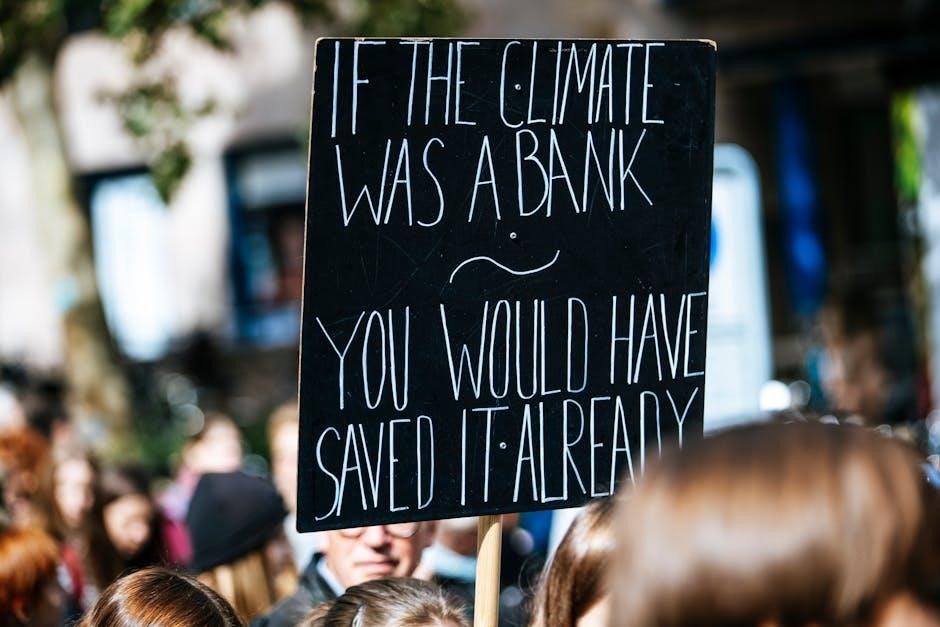The prologue introduces how sugar profoundly shaped global events‚ cultures‚ and economies‚ highlighting its transformative role from luxury to staple and its deep-rooted historical impact.
1.1. The Prologue: Understanding Sugar’s Impact on Global Events
The prologue of Sugar Changed the World sets the stage by highlighting sugar’s profound influence on global events‚ cultures‚ and economies. It introduces the idea that sugar‚ once a rare luxury‚ became a driving force in shaping historical trajectories. The text illustrates how sugar production fueled colonization‚ slavery‚ and economic shifts‚ connecting it to broader themes like trade and cultural exchange. For instance‚ it mentions Madame Villeneuve’s 1714 visit to France‚ symbolizing sugar’s role in bridging continents and societies. By tracing sugar’s journey from its ancient origins to its global dominance‚ the prologue emphasizes its dual legacy as both a transformative commodity and a source of exploitation. This section lays the groundwork for understanding sugar’s enduring impact on the modern world.
1.2. The Transformation of Sugar from a Luxury to a Staple
Sugar’s evolution from a rare luxury to a common staple was a gradual process shaped by colonization‚ trade‚ and technological advancements. Initially‚ sugar was accessible only to the wealthy‚ but as production expanded in colonies like the Caribbean and Brazil‚ its availability increased. The rise of plantation economies and the transatlantic slave trade played pivotal roles in making sugar more affordable and widespread; By the 18th century‚ sugar had become a central commodity in global trade‚ influencing diets‚ economies‚ and cultures worldwide. Its transformation also reflected broader societal shifts‚ including the exploitation of enslaved labor‚ which underpinned the sugar industry’s growth. This shift from luxury to staple underscores sugar’s profound impact on history‚ economy‚ and society‚ highlighting its dual role as a commodity of empowerment and oppression.

The History of Sugar Production

Sugar production traces its origins to ancient civilizations‚ evolving through colonial expansion and enslaved labor‚ becoming a cornerstone of global economies and shaping societies worldwide.

2.1. Ancient Origins: Sugar in Early Civilizations
Sugar’s origins trace back to ancient India around 500 BC‚ where sugarcane was first cultivated and refined into a crystalline form. This early discovery marked the beginning of sugar’s global journey.
In ancient China‚ sugar was considered a rare luxury‚ while in the Middle East‚ Arab traders and scientists advanced sugar production techniques‚ establishing it as a valuable commodity.
The Roman Empire later encountered sugar during their conquests‚ though it remained a scarce and expensive item. These early civilizations laid the foundation for sugar’s eventual spread and transformation into a staple worldwide.
Sugar’s ancient roots highlight its initial role as a luxury good‚ setting the stage for its later impact on global trade‚ culture‚ and economies. Its early history underscores its enduring influence on human society.
2.2. The Role of Colonization in Sugar Production
Colonization played a pivotal role in expanding sugar production‚ as European powers established colonies in regions with climates ideal for sugarcane cultivation. The Americas‚ Caribbean‚ and parts of Southeast Asia became hubs for sugar plantations‚ driven by colonial interests.
European colonizers exploited local and enslaved labor to operate these plantations‚ creating vast wealth for colonial economies. Sugar production fueled colonial expansion‚ shaping global trade networks and economic systems.
Colonization also led to the displacement of indigenous populations and environmental degradation‚ as lands were cleared for sugarcane. This period marked the beginning of sugar’s transformation into a global commodity‚ deeply intertwined with colonial power and exploitation.
The legacy of colonial sugar production remains evident in modern economic structures and cultural practices‚ highlighting its profound historical impact.

Sugar and Slavery
Sugar plantations relied on enslaved labor‚ driving the transatlantic slave trade and shaping global economies. The demand for sugar fueled exploitation‚ profoundly impacting societies and economies worldwide.
3.1. The Triangular Trade and Its Connection to Sugar
The triangular trade was a system of commerce that connected Europe‚ Africa‚ and the Americas‚ with sugar playing a central role. European ships transported goods to Africa‚ where they were exchanged for enslaved people. These individuals were then forcibly brought to the Americas to work on sugar plantations. The sugar produced in the Americas was shipped back to Europe‚ completing the cycle. This system fueled the growth of plantation economies and enriched European nations while perpetuating the exploitation of enslaved labor.
Sugar’s demand drove the expansion of the triangular trade‚ linking global markets and shaping the modern world. The profits from sugar enabled European powers to dominate global trade‚ while the enslaved laborers endured brutal conditions‚ their lives sacrificed for the production of this lucrative commodity.
3.2. Enslaved Labor in Sugar Plantations
Enslaved labor was the backbone of sugar production in the Caribbean and Americas. Millions of Africans were forcibly brought to work on sugar plantations under brutal conditions. The work was relentless‚ with long hours in sweltering heat‚ and punishments for those who could not meet quotas. Living conditions were dire‚ with inadequate food‚ shelter‚ and healthcare. Enslaved people were treated as commodities‚ their lives valued only for their labor. Families were often separated‚ and cultural practices were suppressed. Despite the harsh conditions‚ enslaved individuals resisted through acts of defiance‚ such as sabotaging equipment or escaping. Their labor fueled the sugar industry’s profitability‚ shaping global economies while perpetuating profound human suffering; The legacy of this exploitation remains a critical part of understanding sugar’s impact on the world.

Economic Impact of Sugar
Sugar significantly shaped global economies‚ driving trade patterns and enriching nations through colonial plantations‚ while fostering economic dependency in producing regions.

4.1. The Rise of Plantation Economies
The rise of plantation economies was deeply intertwined with sugar production‚ as vast agricultural estates dedicated to sugar cultivation emerged in tropical colonies. These plantations became the backbone of many colonial economies‚ generating immense wealth for European powers and plantation owners. Sugar’s profitability led to the expansion of plantation systems‚ particularly in the Caribbean and South America‚ where fertile land and favorable climates supported large-scale production. This economic model relied heavily on enslaved labor and created a dependency on a single crop‚ shaping the economic and social structures of entire regions. The wealth generated from sugar plantations not only fueled the economies of colonial powers but also influenced global trade patterns‚ establishing sugar as a cornerstone of international commerce.
4.2; Sugar as a Driver of Global Trade
Sugar played a pivotal role in shaping global trade networks‚ creating intricate connections between regions and fueling economic growth. The demand for sugar in Europe drove the expansion of trade routes‚ particularly the triangular trade system‚ which linked Europe‚ Africa‚ and the Americas. Sugar plantations in the Caribbean and Brazil relied on enslaved labor‚ while European merchants controlled the distribution and refining processes. This created a massive flow of wealth‚ with sugar becoming one of the most valuable commodities in global trade. The sugar trade also spurred the development of shipping industries and financial systems to support its vast operations. As a result‚ sugar not only shaped economies but also forged lasting economic interdependencies between regions‚ making it a cornerstone of global commerce for centuries.

Social and Cultural Impact
Sugar reshaped diets‚ creating sweet-tooth cultures and influencing cuisine globally. It became a status symbol‚ embedding itself in traditions like weddings and holidays‚ reflecting societal values and wealth.
5.1. How Sugar Influenced Diet and Cuisine
Sugar profoundly transformed global diets‚ introducing sweetness as a central flavor in countless dishes. It revolutionized European cuisine‚ enabling the creation of elaborate desserts and pastries. In the Middle East and Asia‚ sugar enriched traditional sweets and beverages‚ embedding itself in cultural practices. The rise of sugar also spurred innovations like chocolate and candy‚ while its preservative qualities allowed for jams‚ jellies‚ and marmalades. Colonization further spread sugar’s influence‚ blending it with tropical fruits and spices to create hybrid dishes. This sweetening of diets not only altered taste preferences but also reshaped agricultural and culinary practices worldwide‚ making sugar a cornerstone of modern cuisine and a testament to globalization’s power.
5.2. Sugar’s Role in Social Hierarchies
Sugar played a pivotal role in shaping social hierarchies‚ particularly in Europe‚ where it was initially a luxury reserved for the wealthy. Its scarcity and high cost made it a status symbol‚ with elaborate sugar sculptures and desserts becoming markers of elite gatherings. As sugar production expanded through colonization‚ it remained a tool of social distinction‚ even as it became more accessible. The refinement process further emphasized its exclusivity‚ with white sugar signifying purity and refinement. In colonial societies‚ sugar plantations reinforced racial and economic hierarchies‚ as enslaved laborers toiled to produce wealth for plantation owners. Sugar thus not only flavored diets but also deepened social divides‚ embedding itself in the structures of power and inequality that shaped the modern world. Its influence lingered long after its democratization‚ reflecting the enduring legacies of colonialism and exploitation.

Environmental Impact
Sugar production caused widespread deforestation‚ water resource exploitation‚ and pollution‚ damaging ecosystems and biodiversity‚ while also contributing to soil degradation and climate change globally.
6.1. Deforestation and Sugar Production
Sugar production has historically driven widespread deforestation‚ as vast land areas were cleared for sugar plantations. The expansion of sugar crops‚ particularly in tropical regions‚ led to the destruction of forests‚ displacing indigenous communities and wildlife. The demand for sugar fueled colonial exploitation‚ with European powers establishing large-scale plantations that required extensive land conversion. Deforestation not only caused ecological damage but also contributed to soil erosion and reduced biodiversity. In many cases‚ forests were burned to make way for sugar cane‚ releasing carbon dioxide and exacerbating climate change; The environmental toll of sugar production remains a critical issue‚ as modern agriculture continues to rely on large land areas‚ often at the expense of natural ecosystems.
6.2. Water Resource Exploitation
Sugar production has significantly impacted water resources worldwide‚ often leading to exploitation and depletion. The cultivation of sugar cane‚ a water-intensive crop‚ requires large amounts of irrigation‚ particularly in regions with low rainfall. This has strained local water supplies‚ affecting both ecosystems and communities. Additionally‚ the processing of sugar requires substantial water for refining and cleaning‚ further exacerbating the problem. The use of pesticides and fertilizers in sugar plantations has also polluted water sources‚ harming aquatic life and human health. In many areas‚ the exploitation of water for sugar production has led to competition between agricultural and domestic needs‚ resulting in water scarcity and social tensions. This highlights the critical need for sustainable water management practices in sugar production to mitigate its environmental and social impacts.

Health Implications
High sugar consumption is linked to various health issues‚ including obesity‚ diabetes‚ heart disease‚ and tooth decay‚ emphasizing the need for moderation in dietary choices globally.
7.1. The Link Between Sugar and Obesity
The consumption of excessive sugar has been directly linked to the global rise in obesity rates. Sugary foods and beverages‚ particularly those with added sugars‚ contribute to an intake of empty calories‚ leading to weight gain. When sugar is quickly absorbed into the bloodstream‚ it triggers insulin spikes‚ which can promote fat storage. This cycle often results in overeating‚ as the rapid drop in blood sugar leaves individuals feeling hungry soon after consumption. Additionally‚ sugary drinks are a major contributor‚ as liquids do not provide the same satiety as solid foods‚ leading to higher calorie intake. The link between sugar and obesity is further complicated by the role of fructose‚ a common sugar found in processed foods‚ which is metabolized in the liver and can contribute to visceral fat storage. Addressing sugar intake is critical to combating the growing obesity epidemic and its associated health risks.
7.2. Sugar’s Role in Dietary Shifts
Sugar has profoundly influenced dietary patterns worldwide‚ driving significant shifts in how people consume food. Its widespread availability and affordability transformed it from a rare luxury into a staple in daily diets. Sugar’s appeal lies in its ability to enhance flavor‚ making it a key ingredient in processed foods‚ beverages‚ and snacks. This has led to a rise in calorie-dense‚ nutrient-poor diets‚ replacing traditional whole foods. The addition of sugar to foods like bread‚ sauces‚ and dairy products has normalized its presence in meals‚ often unintentionally increasing intake. These dietary shifts have reshaped global eating habits‚ contributing to a homogenization of cuisine and a decline in the diversity of traditional diets. Sugar’s integration into modern diets has also fueled the growth of the food industry‚ making it a central component of contemporary nutrition.
Sugar’s impact on the world is undeniable‚ shaping history‚ economies‚ and cultures. Its influence‚ while transformative‚ also brings challenges‚ urging a balanced perspective on its role in society.
8.1. The Legacy of Sugar in the Modern World
Sugar’s legacy is profound‚ shaping modern societies‚ economies‚ and cultures. Today‚ it remains a cornerstone of global food systems‚ yet its impact extends beyond taste. The widespread use of sugar in processed foods has contributed to health crises like obesity and diabetes. Ethical concerns persist‚ as historical ties to exploitation and environmental degradation linger. Modern industries grapple with sustainability‚ seeking alternatives to mitigate harm. Despite challenges‚ sugar’s cultural significance endures‚ reflecting its deep-rooted role in traditions and diets worldwide. As the world evolves‚ the legacy of sugar serves as a reminder of the complex interplay between food‚ power‚ and progress.

